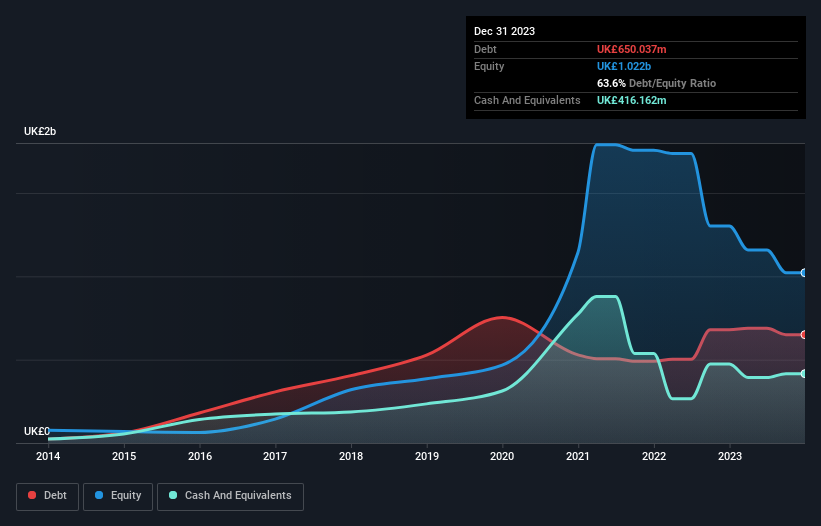Is THG (LON:THG) Using Debt In A Risky Way?
Legendary fund manager Li Lu (who Charlie Munger backed) once said, 'The biggest investment risk is not the volatility of prices, but whether you will suffer a permanent loss of capital.' So it might be obvious that you need to consider debt, when you think about how risky any given stock is, because too much debt can sink a company. We note that THG Plc (LON:THG) does have debt on its balance sheet. But the more important question is: how much risk is that debt creating?
Why Does Debt Bring Risk?
Debt assists a business until the business has trouble paying it off, either with new capital or with free cash flow. In the worst case scenario, a company can go bankrupt if it cannot pay its creditors. However, a more frequent (but still costly) occurrence is where a company must issue shares at bargain-basement prices, permanently diluting shareholders, just to shore up its balance sheet. Of course, the upside of debt is that it often represents cheap capital, especially when it replaces dilution in a company with the ability to reinvest at high rates of return. When we examine debt levels, we first consider both cash and debt levels, together.
See our latest analysis for THG
What Is THG's Net Debt?
The image below, which you can click on for greater detail, shows that THG had debt of UK£650.0m at the end of December 2023, a reduction from UK£679.2m over a year. However, because it has a cash reserve of UK£416.2m, its net debt is less, at about UK£233.9m.

A Look At THG's Liabilities
According to the last reported balance sheet, THG had liabilities of UK£758.6m due within 12 months, and liabilities of UK£1.00b due beyond 12 months. Offsetting this, it had UK£416.2m in cash and UK£271.8m in receivables that were due within 12 months. So it has liabilities totalling UK£1.07b more than its cash and near-term receivables, combined.
Given this deficit is actually higher than the company's market capitalization of UK£803.5m, we think shareholders really should watch THG's debt levels, like a parent watching their child ride a bike for the first time. In the scenario where the company had to clean up its balance sheet quickly, it seems likely shareholders would suffer extensive dilution. The balance sheet is clearly the area to focus on when you are analysing debt. But ultimately the future profitability of the business will decide if THG can strengthen its balance sheet over time. So if you want to see what the professionals think, you might find this free report on analyst profit forecasts to be interesting.
In the last year THG had a loss before interest and tax, and actually shrunk its revenue by 8.7%, to UK£2.0b. That's not what we would hope to see.
Caveat Emptor
Importantly, THG had an earnings before interest and tax (EBIT) loss over the last year. Indeed, it lost a very considerable UK£185m at the EBIT level. When we look at that alongside the significant liabilities, we're not particularly confident about the company. It would need to improve its operations quickly for us to be interested in it. It's fair to say the loss of UK£248m didn't encourage us either; we'd like to see a profit. In the meantime, we consider the stock to be risky. When analysing debt levels, the balance sheet is the obvious place to start. However, not all investment risk resides within the balance sheet - far from it. These risks can be hard to spot. Every company has them, and we've spotted 3 warning signs for THG you should know about.
At the end of the day, it's often better to focus on companies that are free from net debt. You can access our special list of such companies (all with a track record of profit growth). It's free.
Valuation is complex, but we're here to simplify it.
Discover if THG might be undervalued or overvalued with our detailed analysis, featuring fair value estimates, potential risks, dividends, insider trades, and its financial condition.
Access Free AnalysisHave feedback on this article? Concerned about the content? Get in touch with us directly. Alternatively, email editorial-team (at) simplywallst.com.
This article by Simply Wall St is general in nature. We provide commentary based on historical data and analyst forecasts only using an unbiased methodology and our articles are not intended to be financial advice. It does not constitute a recommendation to buy or sell any stock, and does not take account of your objectives, or your financial situation. We aim to bring you long-term focused analysis driven by fundamental data. Note that our analysis may not factor in the latest price-sensitive company announcements or qualitative material. Simply Wall St has no position in any stocks mentioned.
About LSE:THG
THG
Operates as an online retailer in the United Kingdom, the United States, Europe, and internationally.
Undervalued with mediocre balance sheet.
Similar Companies
Market Insights
Community Narratives




